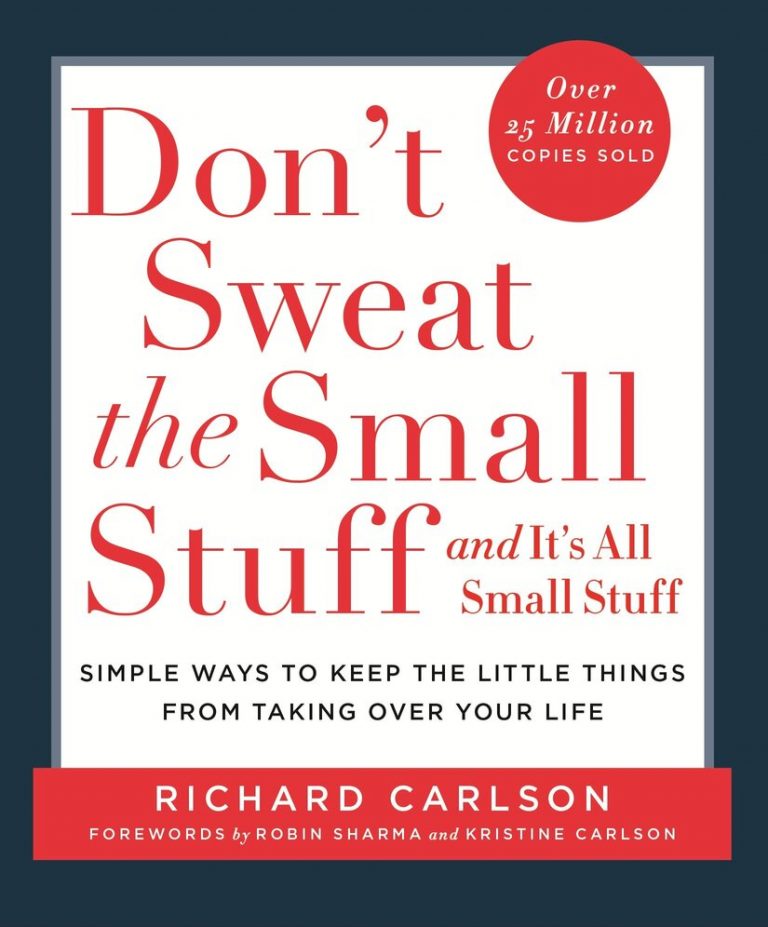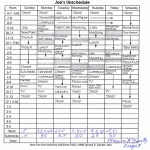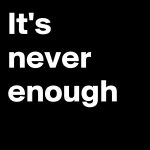Print | Kindle(eBook) | Audiobook
American author and Psychotherapist Richard Carlson shared 100 bit-sized recommendations for living a purposeful life. As a stress consultant, he found that life is not an emergency, and we could use the 100 recommendation to live life on our own terms, stop worrying excessively because, at the end of the day, most of the things we worry about are all small stuff. The sun would rise tomorrow, the wound would heal, and we would gain perspective with each life process. Not sweating the small stuff means you move from always reacting to gaining perspective, letting life flow as it would, stop resisting, and radically accepting the vicissitudes of life.
Favourite Takeaways – Don’t Sweat the Small Stuff
Whenever we’re dealing with bad news, a difficult person, or a disappointment of some kind, most of us get into certain habits, ways of reacting to life – particularly adversity – that don’t serve us very well. We overreact, blow things out of proportion, hold on too tightly, and focus on the negative aspects of life. When we are immobilized by little things – when we are irritated, annoyed, and easily bothered – our (over-) reactions not only make us frustrated but actually get in the way of getting what we want. We lose sight of the bigger picture, focus on the negative, and annoy other people who might otherwise help us.
In short, we live our lives as if they were one great big emergency! We often rush around looking busy, trying to solve problems, but in reality, we are often compounding them. Because everything seems like such a big deal, we end up spending our lives dealing with one drama after another. After a while, we begin to believe that everything really is a big deal. We fail to recognize that the way we relate to our problems has a lot to do with how quickly and efficiently we solve them.
The “other way” of living involves replacing old habits of “reaction” with new habits of perspective. These new habits enable us to have richer, more satisfying lives.
When you “don’t sweat the small stuff,” your life won’t be perfect, but you will learn to accept what life has to offer with far less resistance. As we learn in the Zen philosophy, when you learn to “let go” of problems instead of resisting with all your might, your life will begin to flow. You will, as the serenity prayer suggests,
“Change the things that can be changed, accept those that cannot, and have the wisdom to know the difference.”
#6. Remind Yourself that When You Die, Your “In Basket” Won’t Be Empty
So many of us live our lives as if the secret purpose is to somehow get everything done. We stay up late, get up early, avoid having fun, and keep our loved ones waiting. Often, we convince ourselves that our obsession with our “to do” list is only temporary – that once we get through the list, we’ll be calm, relaxed, and happy. But in reality, this rarely happens. As items are checked off, new ones simply replace them.
Remember, when you die, there will still be unfinished business to take care of. And you know what?
‘Someone else will do it for you! Don’t waste any more precious moments of your life regretting the inevitable.”
#10. Learn to Live in the Present Moment
Many people live as if life were a dress rehearsal for some later date. It isn’t. In fact, no one has a guarantee that he or she will be here tomorrow. Now is the only time we have, and the only time that we have any control over. When our attention is in the present moment, we push fear from our minds. Fear is the concern over events that might happen in the future – we won’t have enough money, our children will get into trouble, we will get old and die, whatever.
To combat fear, the best strategy is to learn to bring your attention back to the present. Mark Twain said, “I have been through some terrible things in my life, some of which actually happened.” I don’t think I can say it any better. Practice keeping your attention on the here and now. Your efforts will pay great dividends.
#14. Create “Patience Practice Periods”
Patience is a quality of heart that can be greatly enhanced with deliberate practice. An effective way that I have found to deepen my own patience is to create actual practice periods of time that I set up in my mind to practice the art of patience. Life itself becomes a classroom, and the curriculum is patience.
You can start with as little as five minutes and build up your capacity for patience, over time. Start by saying to yourself, “Okay, for the next five minutes I won’t allow myself to be bothered by anything. I’ll be patient.” What you’ll discover is truly amazing. Your intention to be patient, especially if you know it’s only for a short while, immediately strengthens your capacity for patience. Patience is one of those special qualities where success feeds on itself. Once you reach little milestones – five minutes of successful patience – you’ll begin to see that you do, indeed, have the capacity to be patient, even for longer periods of time. Over time, you may even become a patient person.
#27. Imagine the People in Your Life as Tiny Infants and as One-Hundred-Year-Old Adults
Think of someone who truly irritates you, who makes you feel angry. Now, close your eyes and try to imagine this person as a tiny infant. See their tiny little features and their innocent little eyes. Know that babies can’t help but make mistakes and each of us was, at one time, a little infant. Now, roll forward the clock one hundred years. See the same person as a very old person who is about to die. Look at their worn-out eyes and their soft smile, which suggests a bit of wisdom and the admission of mistakes made. Know that each of us will be one hundred years old, alive or dead, before too many decades go by. You can play with this technique and alter it in many ways. It almost always provides the user with some needed perspective and compassion. If our goal is to become more peaceful and loving, we certainly don’t want to harbor negativity toward others.
#49. Resist the Urge to Criticize
Being critical not only solves nothing; it contributes to the anger and distrust in our world. After all, none of us likes to be criticized. Our reaction to criticism is usually to become defensive and/or withdrawn. A person who feels attacked is likely to do one of two things: he will either retreat in fear or shame, or he will attack or lash out in anger. How many times have you criticized someone and had them respond by saying, “Thank you so much for pointing out my flaws. I really appreciate it”?
When we judge or criticize another person, it says nothing about that person; it merely says something about our own need to be critical. Criticism, like swearing, is actually nothing more than a bad habit. It’s something we get used to doing; we’re familiar with how it feels. It keeps us busy and gives us something to talk about.
“The solution is to catch yourself in the act of being critical. Notice how often you do it and how bad it makes you feel.“
#54. Understand the Statement, “Wherever You Go, There You Are
“Someone once asked Richard, “What are the people like in California?” I asked him, “What are the people like in your home state?” He replied, “Selfish and greedy.” I told him that he would probably find the people in California to be selfish and greedy.
Something wonderful begins to happen with the simple realization that life, like an automobile, is driven from the inside out, not the other way around. As you focus more on becoming more peaceful with where you are, rather than focusing on where you would rather be, you begin to find peace right now, in the present. Then, as you move around, “try new things, and meet new people, you carry that sense of inner peace with you. It’s absolutely true that “Wherever you go, there you are.
All the Best in your quest to get Better. Don’t Settle: Live with Passion.



2 Comments
Pingback: 50 Audiobooks Listening Challenge 2021. – Lanre Dahunsi
Pingback: 7 ways of reminding yourself of your Mortality. – Lanre Dahunsi